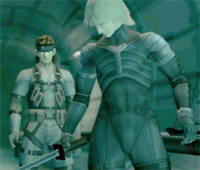 Metal Gear Solid 2 is a game that gets quite a bit of flack from some of the gaming community. The MGS fan kingdom seems to be split down two camps of people that have opposing feelings for the sequel to the hit PS1 game. Personally, I fall into the group of people that generally dislikes MGS2. I remember being so excited for its release, especially after playing the demo that came packaged with Zone of the Enders. I loved the first game’s comic book Die Hard feel, but the sequel just got much too campy, and Raiden was nowhere near as good of a hero as the beloved Solid Snake, in my opinion.
Metal Gear Solid 2 is a game that gets quite a bit of flack from some of the gaming community. The MGS fan kingdom seems to be split down two camps of people that have opposing feelings for the sequel to the hit PS1 game. Personally, I fall into the group of people that generally dislikes MGS2. I remember being so excited for its release, especially after playing the demo that came packaged with Zone of the Enders. I loved the first game’s comic book Die Hard feel, but the sequel just got much too campy, and Raiden was nowhere near as good of a hero as the beloved Solid Snake, in my opinion.
Some years ago, the Delta Head Translation Group published a formal analysis of Metal Gear Solid 2, which is one of the most fascinating pieces of writing I’ve ever read on a video game. It breaks down some of the meta-narrative of MGS2, and what the game might have actually been designed for: to leave the player feeling frustrated. Agree with it or not, it actually gives a really enlightening look at the game, and might even give you pause about your assumptions.
I was reminded of this article because I got into a discussion with JJ about Roger Ebert recently backtracking on his “games can never be art” infamy; he now says that some day they might be. JJ and I got on a tangent about it being hard for something to be fun, artistic, emotional and medium-transcending all at once. I was arguing that fun might not necessarily be a requirement for video games to be art- after all, is watching Schlinder’s List “fun”? In the MGS2 article, the author argues that perhaps the game was designed to make you feel the way it did, and not designed with a fun-factor in mind. If this is truly the case, then perhaps MGS2, as flawed as it is, might be a video game that approaches that territory, where games are turned on their head and go beyond the medium? Portal is probably one of the best examples of a game that deconstructs gaming yet manages to be entertaining and well made.
Anyway, all that mumbo-jumbo aside, you should definitely check out the article, it’s long, but worth the thoughts it gives on what games are supposed to make you feel. And while you’re at it, feel free to weight in on the “games as art” discussion.
Source- Delta Head Translation Group and Roger Ebert
